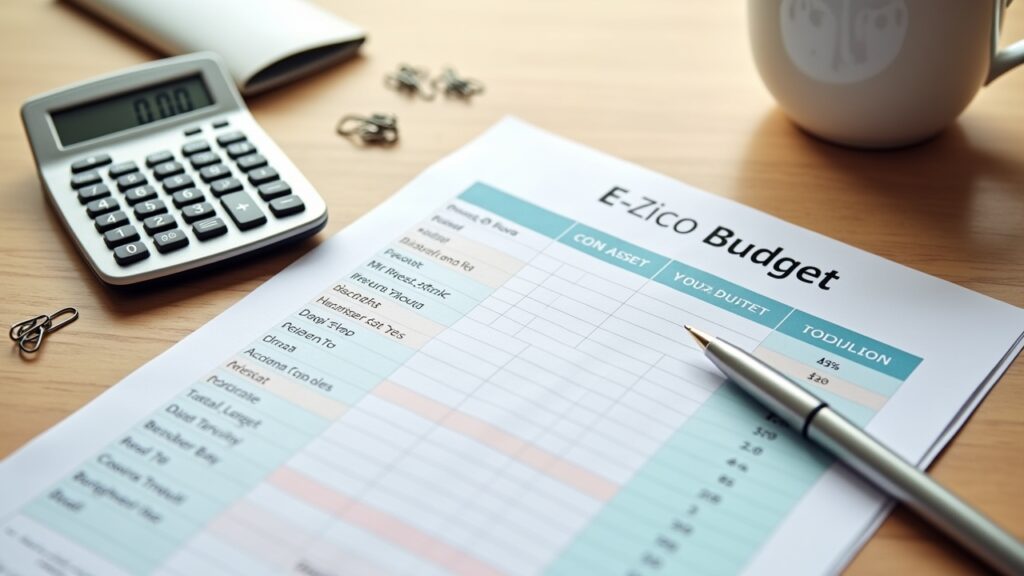Advertisements
You know that sinking feeling when you check your bank account and wonder where all your money went? Yeah, I’ve been there more times than I’d like to admit! After years of financial chaos, I discovered zero-based budgeting, and honestly, it changed everything for me.
Let me tell you, traditional budgeting never worked for me. I’d start strong every January, tracking expenses for maybe two weeks before giving up. But zero-based budgeting? That’s a whole different ballgame.
The beauty of this approach is that every single dollar gets a job before the month even starts. No more mystery spending or wondering why there’s more month than money!
What Makes Zero-Based Budgeting Different

Traditional budgets focus on tracking what you spent. Zero-based budgeting flips that around. You plan where every dollar goes before you spend it.
When I first heard about this concept from Dave Ramsey’s website, I thought it sounded way too restrictive. Boy, was I wrong! It’s actually given me more freedom with my money, not less.
The basic idea is simple: your income minus your expenses equals zero. But that doesn’t mean you spend everything – some of those “expenses” include savings, investments, and fun money too.
Getting Started with Your Zero-Based Budget Template
Alright, let’s dive into the nitty-gritty. First thing’s first – you need to know exactly how much money you’re working with each month.
I remember sitting down with my laptop, a cup of coffee (okay, maybe three cups), and feeling totally overwhelmed. Where do you even start? Here’s what worked for me:
- List all your income sources – salary, side hustles, that random $20 your grandma sends every month
- Track your fixed expenses – rent, insurance, those pesky subscription services
- Estimate variable costs – groceries, gas, entertainment
- Don’t forget irregular expenses – car registration, annual fees
Pro tip: I use YNAB (You Need A Budget) for my template, but honestly, a simple spreadsheet works just fine. The tool isn’t as important as the habit!
My Biggest Mistakes (So You Can Avoid Them)
Oh man, where do I even begin? My first zero-based budget was a disaster. I was way too optimistic about my spending.
I budgeted $200 for groceries for the whole month. For a family of four! What was I thinking? By week two, we’d blown through that and then some.
Another rookie mistake? Forgetting about those sneaky annual expenses. Nothing ruins your budget quite like a $600 car insurance bill you forgot was coming.
Building Your Own Zero-Based Budget Template
After lots of trial and error (emphasis on the error part), I’ve found a template structure that actually works. Start with these categories:
Essential Categories
- Housing (rent/mortgage, utilities, maintenance)
- Transportation (car payment, gas, insurance)
- Food (groceries and dining out – keep these separate!)
- Healthcare (insurance, medications, doctor visits)
Don’t Forget These!
- Personal care and clothing
- Entertainment and hobbies
- Savings goals (emergency fund, vacation, etc.)
- Debt payments beyond minimums
The trick is being realistic. If you love eating out, budget for it! Trying to go cold turkey usually backfires spectacularly – trust me on this one.
Making It Stick: Tips from the Trenches
Creating the budget is one thing. Actually sticking to it? That’s where the rubber meets the road.
I’ve found that checking in weekly makes a huge difference. Every Sunday morning, I review where I’m at. Sometimes I need to move money around – and that’s totally okay! Life happens.
One game-changer for me was using the envelope method for variable expenses. No, not actual envelopes (though some people swear by that). I use separate savings accounts for different categories. When the eating out fund is empty, we’re done dining out for the month. Simple but effective!
Work Your Way Up Again

Look, I’m not gonna sugarcoat it – zero-based budgeting takes work. The first few months can be frustrating as you figure out what numbers actually work for your life.
But here’s the thing: it gets easier. Way easier. Now, budgeting takes me maybe 30 minutes a month, and I actually know where my money’s going. No more end-of-month panic!
Remember, your budget should work for you, not against you. If something’s not working, change it! This is your financial journey, and there’s no one-size-fits-all solution.
Ready to take control of your finances? Start with a simple template today, and don’t be afraid to adjust as you go. For more practical money management tips and financial wisdom, check out other posts at Cashflow Zen. Your future self will thank you!



[…] practical money tips at Cashflow Zen – we’ve got tons of real-world advice to help you master your money, no matter what you’re […]